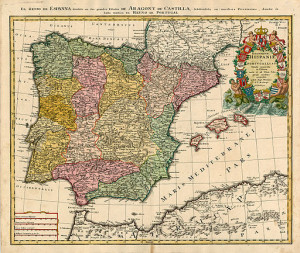By Sarina Roffé
People often ask me to define the term “Sephardic Jew.” The answer is complicated. No, it does not mean “from Spain,” although that is the commonly understood definition.
It also does not mean anyone who is not Ashkenazi. For example, Jews who migrated to Italy during the time of Judah Maccabee or as slaves under Julius Caesar do not think of themselves as Sephardic. Neither do Greek or Persian Jews.
Do they use Sephardic liturgy? Yes. Sephardic texts? Yes. Common religious customs? Yes.
But these groups do not think of themselves as Sephardim. So who is a Sephardic Jew?
According to references in Genesis 10:3 and Obadiah 1:20, the lands called Sepharad were in areas north of the Holy Land, and were not necessarily in Spain and the Iberian Peninsula. If you define a Sephardic Jew as someone who can trace himself back to Spain before 1492, when the Jews were expelled by King Ferdinand and Queen Isabella, then you must still consider the ancestry of the Spanish Jews.
They were the descendants of Jews who came in waves to the Iberian Peninsula from modern-day Egypt, Iraq, Israel, Syria and across North Africa. Arabic was the principal language in large sections of Spain until the Christian conquests and was used by Jews for daily communication and religious practice.
In other words, Sephardic Jews traveled to Spain from the Middle East, then returned to the Middle East before spreading to North Africa and beyond. Today, the term “Sephardic” has come to be accepted as a reference to Jews whose ancestors settled in countries around the Mediterranean, North Africa, the Balkans, Italy and the Levant, as well as Jews who already lived in those places.
Have I settled this? Or are you more confused now than you were before? Do you understand how to define a Sephardic Jews? Probably not—but that’s ok, academics can’t agree on it either.
Image courtesy of Wiki Commons.


thank you for the clarification – i became aware of my Separdic Jewish ancestry a few months ago my understanding of my family’s ancestry was misinformed 53 years is a long time so i have lots of catching up to do
The term Sephardic referred to people living in Spain and Portugal during Talmudic times, and who developed a distinct tradition. It did not include Levantine, North African, Greek, Italian and Persian Jews.
And it was not use for all Jews in Iberia either. Yosef Caro (16th c.) differentiates between the customs of Catalonian Jews (in northern Spain) and Sephardic Jews.
Absolutely correct David. While many Jews made the return (forced to evacuate) from Iraq, Egypt etc., in the Middle East following the Statehood of Israel and are thought of as Sephardic Jews (darker complicated) the term historically does represent those Jews of lived, were born and were highly involved in the Society of Spain during the enlightenment period, living in peace under the Sultan’s rule prior to the wars that led to Catholic dominion under Queen Isabella and King Ferdinand. There is religious differences between the Ashkenazi and the Sephardim mainly in food items allowed during Passover as the two cultural systems developed over the years (rice for example is consumed by Sephardic Jews not Ashkenazi Jews). Of note is the underlying prejudice that exist in Israel today, and how the Sephardim were treated in comparison to the Ashkenazi Jews who predominantly became parliamentary members of the Knesset. .
I think the author is referring to Greek Jews who are Sephardic. My husband is one. His family, up to the last generation was fluent in Ladino. They were resettled in parts of the Othoman Empire. Greek Jews also can be Romanites but that is a whole other group.
I think many Jews became Christian and fled during the Spanish Inquisition?
Yes, Jews in Spain were ordered to convert (became mezo Jews) on the pain of death having remained in the country during the Expolsion of 1482. It was these Crypto-Jews who continued to worship in secret that the inquisition was first formed to ‘out’ these Christian who supposedly practiced Judaism in secret that were to be ferreted out as heretics.
There are many who are making the return to Judaism as a result of asking questions for example; “why did my Grandmother always go into a closet to light candles on Friday night”, Why did my grandmother make roast pork on certain occasions, yet refused to eat pork on Most other non-public viewed family gatherings? Blessed is the Lord Our G-d.
I am of Sephardic Jewish descent and I find this interesting thanks
I am reading the book kings and I found a group called Sepharvaim, they were not Jewish but were settled there by the Assyrian King. When we say Sephardic Jews how can we know they are not descendants of these people. Israel had twelve tribes. Where do the Sephardic Jews fit?
Exactly, so are you saying jews from the middle east traveled through north African then to Spain used the term Sephardic/ because my family came from Spain DNA is showing north African Sephardic middle east so forth.
I just found out my Grandparents were Sephardic Jews. My understanding is their family began in Spain, then to Holland and then the UK (London). Can you share anything special about their heritage?